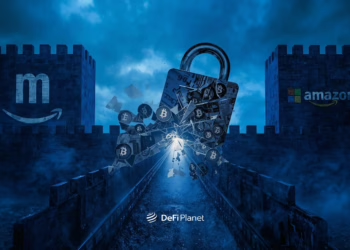For a long time, venture capital firms have invested in companies they believe have the potential to be profitable. These venture capital (VC) firms are typically centralized, which means that only a few people make investment decisions.
A venture capital firm may be funded by a group of people, but they are not involved in the firm’s day-to-day operations and may not be allowed to choose which organizations to fund.
With the advent of blockchain technology and its decentralization element, a new type of investment organization, known as an Investment Decentralized Autonomous Organization, has emerged.
Investment DAOs appear to be eclipsing venture capital firms, owing to their decentralized nature and lower entry barriers.
This article examines the definition of a DAO, an investment DAO, and the benefits and risks associated with investment DAOs.
What is a Decentralized Autonomous Organization?
A Decentralized Autonomous Organization (DAO) is a blockchain-based organization that aims to address the principal-agent dilemma.
The principal-agent dilemma exists whenever an organization is structured in such a way that an entity or agent serves as the central authority. This agent is in charge of making decisions for the entire entity or the principal.
According to the principal-agent dilemma, whenever such an entity exists, there is an inherent risk in the divergent goals, priorities, and safeguarding of all stakeholders’ interests.
This means that there is a risk that the agent might at some point be motivated to act in its own self-interest rather than in the interests of the principal and its stakeholders.
Decentralized Autonomous Organizations are designed to achieve different purposes. Some may be created as gaming guilds, where players can access the in-game assets they need to explore a game. A gaming guild is usually a haven for gamers, investors, scholarship managers, gaming platforms, and average users.
A DAO may be an investment DAO, which provides investment opportunities to its members. Most DAOs have native tokens or NFTs that users must hold in order to become members.
A voting session is held before any major decision is taken. Holders of the native token can vote and submit proposals as needed during the voting session. Decentralized Autonomous Organizations are created to achieve various goals and are managed by smart contracts deployed on the blockchain.
What is an Investment DAO?
Investment DAOs are decentralized organizations created to allow their members to invest in different opportunities. Usually, an investment DAO may focus its attention on one area, such as NFT projects like Bored Ape Yacht Club NFTs.
A DAO may offer its members real estate opportunities or DeFi investment packages. The decision on which assets to invest in falls into the hands of the committee members. Sometimes, a DAO may not start out as an investment DAO but decide to incorporate the feature as an afterthought.
In some cases, a DAO may decide to invest in opportunities in their chosen niche, thereby offering investment opportunities. For instance, Yield Guild Games and IndiGG are primarily gaming guilds but are also involved in funding some blockchain gaming platforms.
Investment DAOs may be subject to regulation based on their jurisdiction. It is crucial to seek professional advice before joining one.
What are the Differences Between Investment DAOs and Venture Capital Firms?
Investment DAOs bear similarities to venture capital firms. Venture capital firms invest in innovative organizations that will improve their investment portfolio. Like investment DAOs, venture capital firms tend to analyze the organization they want to invest in and run background checks on the management teams.
Venture capitalists expect their investments to generate returns; the same is true for an investment DAO.
The main distinction between VCs and investment DAOs is that the latter is not recognized in most regions. Traditional investment regulations are strict, and some jurisdictions may only allow registered venture capitalists to participate. This means that investment DAOs can only access blockchain-based investment opportunities.
Another distinction between the two investment firms is the barrier to entry. The VC firm may only accept investors who meet a certain threshold, which could be millions of dollars.
They only accept funds from a small number of investors, making it difficult for the average investor to access the VC’s investment opportunities.
Investment DAOs, on the other hand, democratize the concept of investment. In most cases, the minimum threshold is insignificant in comparison to VCs. Anyone can improve their portfolio using investment DAOs.
Third, venture capital firms do not solicit investor advice before investing funds in a company. In a typical VC firm, investors have little control over where their funds are invested. The same cannot be said for a DAO for investment. As a DAO, community members who also hold the native token have the ability to make decisions in the organization.
They can use their tokens to vote on proposals that appeal to them. Not only that, but token holders have the ability to choose the council members who oversee the daily operations of the investment.
How Does An Investment DAO Function?
Investment DAOs tend to have an underlying purpose. The principle and expectations are integrated into the smart contract’s code during its creation.
Some investment DAOs may focus investments on a specific industry, whereas others may invest in organizations across multiple industries.
Popular investment niches include decentralized finance, blockchain gaming, NFT projects, and tokenized real-life assets.
The governance token is critical to the platform’s operations—community members run investment DAOs. Members typically contribute to the DAO’s treasury by purchasing governance tokens. They can vote on investment decisions using the governance token.
To ensure that only serious members participate in the vote or proposal submission process, the DAO may require them to stake a certain number of tokens before they can vote.
Profits from investment opportunities may be distributed in accordance with an earlier agreed-upon ratio.
A portion may be distributed to community members, while the remainder is held in the DAO’s treasury for future reinvestment.
Community members may receive returns in the form of staking rewards or airdrops.
Some investment DAOs allow token holders or community members to borrow funds from the treasury while using valuable cryptocurrencies or NFTs as collateral.
Typically, the borrower is expected to repay the capital plus interest after a specified period.
What Are The Benefits of Investment DAOs?
Investment DAOs offer some benefits to community members or investors, which will be discussed below.
Investment opportunities
Users can gain access to investment opportunities through investment DAOs. An investor may purchase assets from a firm or platform in another country courtesy of an investment DAO.
Low entry barrier
In most investment DAOs, the minimum requirement for entry is affordable for the average investor. This means anyone can own the governance token, participate and earn returns.
Pooling of funds
In the blockchain space, both venture capital firms and investment DAOs fund innovative projects during their seed round or other early funding rounds. This allows them to purchase the native tokens of these blockchain platforms at an affordable value before they become mainstream.
An average investor may be unable to afford the buy-in amount for the funding round, or they may not have access to the necessary information.
Investment DAOs allow multiple investors to pool funds together and buy into projects at their earlier stages.
Decentralization
Investment DAOs permit token holders or investors to participate in the organization’s governance process. This is advantageous for investors who want to control how their funds are spent.
What Are the Limitations of Investment DAOs?
Investment DAOs may be innovative, but they are also plagued with risks.
Poor decisions
Investment DAOs function based on majority decisions. Sometimes, the majority’s decision may be false, especially when sentiments are involved.
Risk of centralization
Despite the fact that DAOs are decentralized, there is still a risk of centralization, particularly if a single person or a small group of investors owns the majority of the governance tokens. This means that the holder(s) with the most tokens can tip the scales to their advantage, regardless of the community’s opinions.
Smart contract risk
Smart contracts are the backbone of investment DAOs. If a loophole is found in the code of a smart contract, it could degenerate into an attack on the DAO and its treasury.
Embezzlement and rug pull.
DAOs may be decentralized, but they are typically created by a group of individuals. The DAO is sometimes controlled by an elected council of members who have limited access to the treasury and its funds. This could result in a rug pull or mismanagement of community funds.
In Conclusion,
- A Decentralized Autonomous Organization (DAO) is a blockchain-based organization that aims to solve the principal-agent dilemma.
- Investment DAOs are decentralized organizations that provide members with a variety of investment opportunities.
- A significant difference between VCs and investment DAOs is that most regions do not recognize the latter.
- Investment DAOs are formed with a specific goal in mind.
- Conduct adequate due diligence before becoming a member of an investment DAO.
If you would like to read more articles like this, visit DeFi Planet and follow us on Twitter, LinkedIn, Facebook, and Instagram.
“Take control of your crypto portfolio with MARKETS PRO, DeFi Planet’s suite of analytics tools.”




















